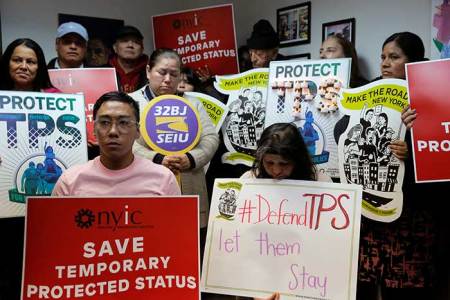Christian Leaders Oppose Trump's Stripping of Protected Status for Salvadoran Immigrants

Christian leaders and organizations are speaking out against the Trump administration move on Monday to terminate protected status for thousands of El-Salvadoran immigrants who have been allowed to live and work in the United States for over a decade.
Secretary of Homeland Security Kirstjen Nielsen on Monday made a decision to terminate "Temporary Protected Status" that has allowed El-Salvadoran immigrants to legally work and live in the U.S. since two earthquakes struck the Central American country in 2001. The move could affect up to nearly 200,000 people and it's a move that prominent evangelical leaders pressured the Trump administration not to make.
The administration claims the decision, which takes effect in September 2019 after an 18-month transition period, was made after an "inter-agency consultation process" determined that "the original conditions caused by the 2001 earthquakes no longer exist." Yet, human rights advocates are warning that El Salvador is not economically able to sustain a massive return.
"But the reality is that El Salvador is among most violent countries in the world & among poorest in Western Hemisphere," Matthew Soerens, the director of church mobilization for the evangelical refugee resettlement organization World Relief, tweeted on Monday. "It will be significantly destabilized by sudden insertion of so many returnees & by sudden halt of remittance money sent home by workers in US."
Soerens explained in a tweet chain that the decision does not mean that all 200,000 Salvadoran immigrants will be deported.
"What is more certain is that most will lose their jobs, because employers will be lawfully required to let them go when their currently valid work authorization expires," Soerens wrote, stating that 82 percent of women and 94 percent of men who have TPS are employed. "A few employers will look the other way (at risk of penalty), but most will likely abide by the law."
Critics have also warned that the Trump administration's decision could affect thousands of U.S.-born children whose parents would become vulnerable without protected status.
The think tank Center for Migration Studies estimates that there are more than 192,000 U.S.-born citizens whose parents are El Salvadoran TPS beneficiaries.
The decision could also negatively impact TPS recipients who came to the U.S. as children. According to the think tank, about 68,000 TPS recipients (including those from other countries besides El Salvador) arrived to the U.S. as children below the age of 16.
"The decision to terminate TPS for El Salvador is heartbreaking. As detailed in our recent delegation trip report to the region, El Salvador is currently not in a position to adequately handle the return of the roughly 200,000 Salvadoran TPS recipients," Bishop Joe S. Vásquez, chairman of the United States Conference of Catholic Bishops' committee on migration, said in a statement, adding that the decision will "fragment American families.
"Families will be needlessly separated because of this decision."
The USCCB delegation report on Honduras and El Salvador, which was published last October, called for TPS status to be extended an additional 18 months. The report stated that neither country has the ability to "adequately handle the return of its nationals if TPS is not renewed." The TPS program began under the administration of Republican President George W. Bush and continued in the Obama presidency.
The Evangelical Immigration Table, a coalition evangelical organizations that represent millions of believers across multiple denominations, also pressured the Trump administration to extend the TPS program for El Salvador until a permanent legislative fix can be enacted through Congress.
"The roughly 200,000 individuals from El Salvador who currently are lawfully present under TPS protections each voluntarily came forward at the invitation of the federal government, passed a criminal background check (and multiple subsequent background checks with each renewal), and have demonstrated that they are economically self-sufficient, as they do not qualify for federal means tested public benefits," a letter, sent by Evangelical Immigration Table leaders to Nielsen last Thursday, reads. "They contribute significantly to our national economy, including paying roughly $4.8 billion in Social Security and Medicare taxes over the past decade and much more as consumers, employees in critical sectors of our economy, and entrepreneurs."
The letter explains that El Salvador suffers from "chronic" unemployment and underemployment that could become worse if thousands are forced to return. The letter also asserts that the Salvadoran immigrants are now "established parts of our communities," members of local churches and students at local schools and colleges.
"Most Salvadorans granted TPS have been present in the United States for twenty years or more, and they have put down roots here," the letter explains. "Most are parents of one or more U.S. citizen children; if these parents were to be deported or simply no longer authorized to work, it would create a significant strain on these U.S. citizen children and other immediate family members — and on both public and private social support systems for which these citizen children would qualify."
The letter was signed by prominent evangelical leaders such as Russell Moore, president of the Southern Baptist Convention's Ethics & Religious Liberty Commission; Shirley V. Hoogstra, president of the Council for Christian Colleges and Universities; Leith Anderson, president of the National Association of Evangelicals; and Samuel Rodriguez, president of the National Hispanic Christian Leadership Conference.
"It is not in the best interest of a society to separate families, or to force them into volatile situations," Moore said in a statement in November. "And yet, fears of such are exactly what many immigrants who have been granted TPS feel — men and women who have come forward by invitation of our government, obeyed the law, and contributed much to our churches and society."
Although Soerens believes the Trump administration's decision on El Salvador was "wrong," he is calling on Congress to pass legislation that would allow those who have TPS to apply for permanent legal status.





















